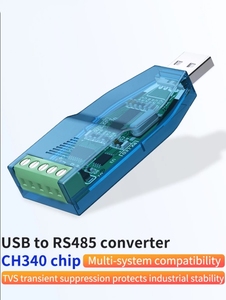
Compatibility V2.0 Standard RS-485 A Connector Board Module Industrial USB To RS485 Converter Upgrade Protection RS232 Converter


Isolated RS485 Data Acquisition Module Modbus RTU Communication Converter 0-10v Analog To Digital Signal























The realm of data communication is complex, with various protocols and interfaces designed for specific environments and purposes. Among these, the converter rs232 to rs485 plays a crucial role in enabling communication between devices that use different standards. RS232 and RS485 are serial communication protocols, with RS232 being common in personal computers and RS485 used for its greater range and multi-device support.
A rs232 to 485 converter is an essential device that bridges the gap between RS232 and RS485 communication standards. It converts the single-ended signals of RS232 to the differential signals of RS485, which allows for longer cable lengths and the connection of multiple devices on the same network. These converters are typically used in industrial and commercial settings, where robust communication systems are necessary.
The application of rs232 to rs485 converters is vast, ranging from industrial automation to point-of-sale networks. The converters are designed to withstand harsh environments and can be used to connect various devices like PLCs, sensors, and CNC machines. Features often include isolation to protect against voltage spikes, LED indicators for monitoring data transmission, and adjustable baud rates to ensure compatibility with different devices.
When selecting a rs232 to 485 adapter, the build quality is paramount. Most converters are encased in durable materials that shield against electromagnetic interference, a common challenge in industrial environments. The design often includes a rs 485 db9 connector, known for its reliability and ease of use.
With various models available, it's important to choose a rs232c to rs485 converter that matches your system's requirements. Considerations should include the number of devices to be connected, the required data transfer rate, and the operating environment. It's also essential to ensure compatibility with the existing hardware to facilitate a seamless integration.
The transition from rs232 to rs485 using a converter comes with several advantages. RS485's ability to support multiple devices over long distances without sacrificing data integrity is a significant benefit. Additionally, the use of a rs485 to rs232 converter can result in cost savings, as it allows for the use of existing RS232 devices within a modern RS485 network.